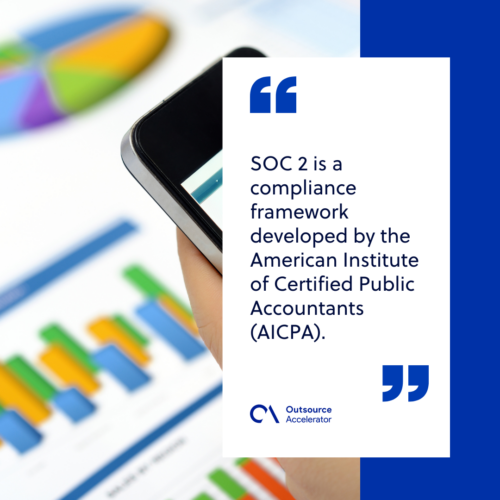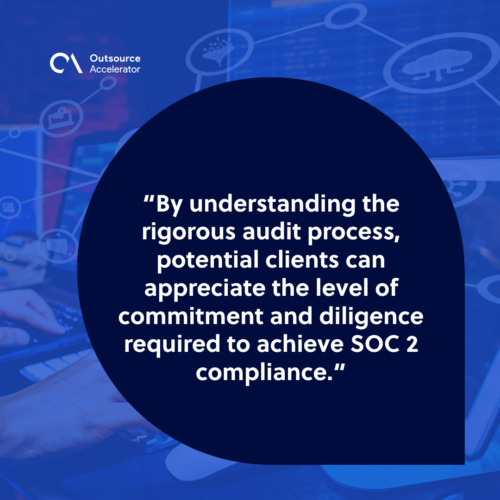Understanding SOC 2 compliance and its importance for MSPs, BPOs, and clients

This article is a submission by MotivIT. MotivIT provides IT services globally using advanced technology for contact center solutions, software development, cloud services, network operations centers, global desk service, and managed IT services.
Data security is paramount especially for Managed Service Providers (MSPs) and Business Process Outsourcing (BPO) companies that handle sensitive client information. One of the most significant certifications that an organization can achieve is SOC 2 (Service Organization Control 2).
This article explores what SOC 2 is, why it is critical for MSPs and BPOs, and clients.
What is SOC 2?
SOC 2 is a compliance framework developed by the American Institute of Certified Public Accountants (AICPA). It establishes criteria for managing customer data based on five trust service principles:
- Security
- Availability
- Processing integrity
- Confidentiality, and
- Privacy
Achieving SOC 2 compliance indicates that an organization has implemented stringent security measures to protect client data and has undergone a rigorous audit to validate these controls.
Notably, SOC 2 Type 2 certification goes further, involving a thorough examination of an organization’s controls over a period, ensuring they are not only in place but are also effectively operational over time.

Why is SOC 2 important for MSPs and BPOs?
For MSPs and BPOs, achieving SOC 2 compliance not only enhances data security but also builds client trust, demonstrating a commitment to safeguarding sensitive information. This certification can be a decisive factor in winning contracts and maintaining long-term client relationships in an increasingly security-conscious market.
Here are five other benefits of securing SOC 2 compliance for MSPs and BPOs:
1. Enhanced security
Partnering with a SOC 2 Type 2 certified MSP or outsourcing firm ensures robust security protocols are in place to protect sensitive data from unauthorized access and cyber threats. This certification demonstrates a commitment to maintaining high security standards, which is crucial as data breaches become increasingly common.
2. Regulatory compliance
Many industries, such as healthcare and finance, are subject to strict regulations regarding data handling.
SOC 2 compliance helps MSPs and BPOs meet these regulatory requirements, ensuring that they manage and store sensitive information in a compliant manner. This not only protects clients from potential fines but also enhances the organization’s reputation as a reliable partner.
3. Reduced risk of data breaches
Data breaches can have devastating effects on a business’s reputation and finances. By working with a SOC 2 certified provider, organizations can significantly lower the risk of such incidents due to the effective security controls in place.
4. Business continuity
SOC 2 certified organizations are required to have business continuity plans that minimize disruptions during unforeseen events, such as security breaches. This ensures that client operations can continue smoothly, even in challenging circumstances.
5. Building trust and reputation
Achieving SOC 2 compliance not only enhances an organization’s security posture but also builds trust with clients. In an era where data security is a top concern, being SOC 2 compliant can differentiate a company from its competitors, leading to increased client retention and attracting new business.
Real benefits for customers of managed IT services and virtual assistants
Let’s take a look at some of the real-life benefits of having an SOC 2 compliance for IT-BPO clients:
Example 1: A healthcare provider
A small healthcare provider signs up with a SOC 2 Type 2 certified MSP for managed IT services. Given the sensitive nature of patient data, regulatory compliance with HIPAA (Health Insurance Portability and Accountability Act) is critical.
By choosing a SOC 2 certified MSP, the healthcare provider ensures that their patient data is handled with the highest security standards. This compliance reduces the risk of data breaches, which could result in severe fines and damage to their reputation. Additionally, the MSP’s business continuity plan ensures that critical healthcare services remain operational during any IT disruptions.
Example 2: A financial services firm
A financial services firm requires virtual assistant (VA) services to manage client communication and administrative tasks. By partnering with a SOC 2 Type 2 certified BPO, the firm ensures that sensitive financial information is processed and stored securely.
The BPO’s adherence to the trust service principles means that the firm can confidently delegate tasks without worrying about unauthorized access to client data. This secure handling of data not only meets regulatory requirements but also builds trust with clients, who are assured that their financial information is safe.
Example 3: An e-commerce business
An e-commerce business partners with a SOC 2 certified MSP for IT support and cybersecurity. The MSP’s robust security measures protect the business’s customer data from cyber threats, such as hacking and phishing attacks.
The MSP’s regular security assessments and incident response plans mean that any security threats are quickly identified and mitigated, minimizing downtime and potential financial losses. This partnership enables the e-commerce business to focus on growth and customer service, knowing that their IT infrastructure is secure and compliant with industry standards.
Understanding the SOC 2 audit process
To provide a more comprehensive understanding of SOC 2, it’s essential to delve into the audit process. This involves system selection, description, control implementation, testing, and report preparation.
By understanding the rigorous audit process, potential clients can appreciate the level of commitment and diligence required to achieve SOC 2 compliance.

The Benefits of SOC 2 for MSP Clients
Beyond the advantages for MSPs and BPOs, SOC 2 certification offers significant benefits to their clients, including risk mitigation, compliance assurance, operational efficiency, and a competitive advantage.
SOC 2 and cyber resilience
Cyber resilience is the ability of an organization to anticipate, prepare for, respond to, and recover from cyberattacks. SOC 2 compliance is a critical component of building a robust cyber resilience framework.
By adhering to the five trust service principles, MSPs and BPOs can enhance their ability to withstand and recover from cyberattacks.
- Risk identification and management: SOC 2 requires organizations to identify potential threats and vulnerabilities, enabling them to implement appropriate safeguards.
- Business continuity: SOC 2 mandates the development of business continuity plans, ensuring operations can continue in the event of a disruption.
- Incident response: SOC 2 compliance fosters a culture of preparedness, enabling organizations to respond effectively to cyber incidents.
The future of SOC 2
The digital landscape is constantly evolving, and so are the threats. To stay ahead, the AICPA regularly updates the SOC 2 framework. It’s likely that the scope of SOC 2 reports will expand to include additional trust service principles, such as sustainability and governance.
SOC 2 compliance: Final thoughts
SOC 2 compliance is not merely a regulatory checkbox; it is a fundamental aspect of providing exceptional IT services. For MSPs and BPOs, prioritizing data security and achieving SOC 2 certification is essential for building trust, mitigating risks, and driving business growth.
Firms like MotivIT are committed to exceeding industry standards and delivering the highest level of data protection to clients.







 Independent
Independent




